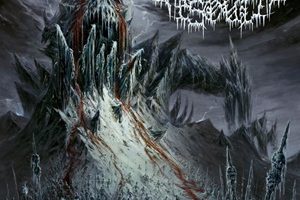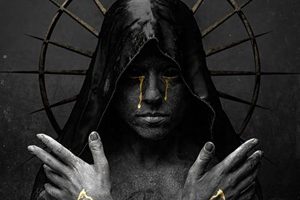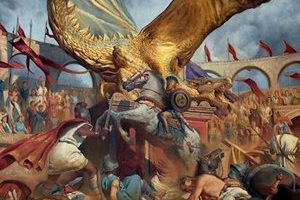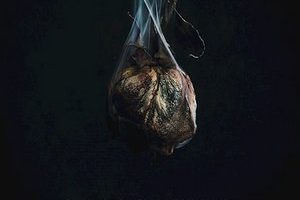Trivium – Still Ascending
Monday, 20th November 2017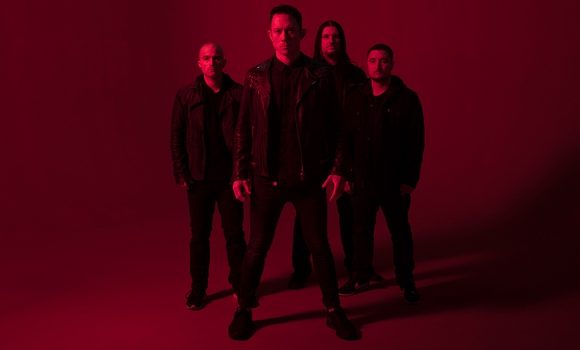
Being thrust into the limelight back in 2005 with their second album Ascendency, Trivium has been in the public eye ever since. They have long survived many of the NWOAHM acts that surfaced around that same point, and while there may have been some bumps in the road at times, they do seem to have identified who they are as a band. They’ve maintained a presence and have managed to grow with each successive release.
Their latest album, The Sin and the Sentence, they are completely comfortable with who they are as a band. The confidence level shows throughout the album, in the way that it mixes all the things that Trivium has managed to do in the past, as well as some new added bonuses, to create what is arguably their strongest release to date. Before the band’s show in Worcester, MA, DR was able to chat with bassist Paolo Gregoletto in an honest chat about The Sin and the Sentence, drummer Alex Bent’s influence, identifying the Trivium sound, and how they have been championing younger acts on their recent tours.
Dead Rhetoric: In terms of the older fans, personally I got into you guys back with Embers to Inferno and Ascendency, and went in and out over the years. Do you feel that this new album is getting a lot of the older fans back in?
Paolo Gregoletto: It’s hard to say what that number would be, but I feel like, for people who haven’t really listened to us in a while, or people that have been with us since the beginning but not necessarily into the last couple [records], I think it’s definitely ignited people’s love for what we do. It feels good; we are off to a great start. What’s been great is that the people that we have brought in the fanbase in the last few records, really love what we are doing on this one. It’s sort of like the best of both worlds, and a unifying album, which is something we haven’t really had yet.
Dead Rhetoric: If you listen to it, it almost feels like a ‘greatest hits’ of new songs.
Gregoletto: Yeah – we put a lot of time into the detail of the music. Bringing Alex [Bent] into the band was one of those things that we didn’t foresee happening until we were writing the record with him. Then it was like, “Whoa, this is going to go above and beyond what we had initially envisioned for the record.” I don’t know where we would have ended up without him. It was really great timing, the right group of people, the right producer, and the right riffs coming together at the right time.
Dead Rhetoric: Do you feel that he [Alex Bent] brought a more extreme influence in?
Gregoletto: He got to do a tour with us before we recorded. He got to play a full set of old music. I think what was good, was that he was going to come in…we had written a couple of songs with him before we did it, so he was playing and learning the old stuff – getting a crash course in what Trivium was. What was cool was that he was able to take his style of playing, learn all the other guys’ styles with learning the old songs, so that he could be like, “Alright, this is where Trivium is coming from, with the drumming from the past. Here’s my take on that.” When we got into the room, we discussed how we felt that our music is this combination of all the very heavy elements that we love, the melodic elements, the rock, the metal, and everything in between. We explained and jammed out to those kind of things.
He was able to really take the extreme side of our sound to a level that we just haven’t had. His extreme playing is very tasteful – there’s a lot of cymbal work. It’s the type of extreme drumming that I love, like Gene Hoglan, Nick Barker…those are two of his idols. It’s kind of a crazy thing to have a guy just come into the band and be like, “These are the kind of guys that I have emulated in my playing.” And those are the same type of drummers I like to listen to. It’s very smart playing; while it’s crazy, it’s like, “Whoa, that was very musical. That was incredible.” There’s so much going on, it just colored the music that we were playing. We can sit back and riff out on something, and he’s just going to town behind us and it really stands out right away. Metal bands are judged by their drummers before anything.
Dead Rhetoric: I know you haven’t had the best luck with drummers over the years, do you feel that things are hopefully solidified now?
Gregoletto: Alex is a great dude. A lot of this is just having good vibes, getting along, and meshing. Having an understanding of what the situation is. We have learned that communication is the most important thing. From the beginning to now, you have to communicate with the guys in the band if something is up or not. I would love to say that Alex will be here forever. Knock on wood, Alex is the dude. He’s playing like he’s the dude. We told him, “This is yours if you want it. You take it as far as you want to go. You are a great player, you fit with us. You are an awesome dude. You are young – this is your time to shine.”
We are kind of getting a vibe from the fans, in what they love, and everyone is like, “This guy is the shit!” We take feedback from the fans and when we hear that kind of stuff, of course it makes us want to continue. In the past, it was never like…it just fell apart. What can you do at some point? If it’s not working, it’s not working. So far it’s only been really great.
Dead Rhetoric: You mention the fans – obviously you write for yourselves. But how important is that fan feedback?
Gregoletto: We write for ourselves – we don’t sit and kind of analyze like, “We have to write this type of song to get this fan, or this and that.” People come to us because we fill a certain need in their musical listening, and they trust that we are going to deliver that for them. So for us, when we go into write, we shut off the world. We think about what we want to do, we visualize it, we make the concepts and riffs, and piece it all together. The way I judge it, if a song’s going to be good is if I’m having a great time playing it with no one around in the rehearsal and it’s feeling good, I know that the fans are going to dig that. They are going to sense that in the music.
The new songs live, right away there’s just an energy. We played them so much, we made them feel as natural as possible. In the back of your mind, you are like, “This is going to be great to play live!” But you never know how someone is going to react to a song right away. You have to trust your own instincts when you are writing. Believe in yourself, believe that you have fans for a reason. They trust that you know what you are doing, and we just get in there and try to have the best time possible, and that usually produces the best music.
Dead Rhetoric: Along those same lines, the band has swerved a bit sometimes in terms of sound. How much of a focus is there on just identifying what Trivium is, moving forward?
Gregoletto: I guess the records that I have personally loved the most were where we really have everything. There’s the heavy and melody, screaming and singing, the fast drums, the rock. If there’s no limit on what we are supposed to be doing, if we are completely in control of the writing in terms of how much preparation we have before we hit the studio, I think we have nailed it pretty much every time. When we have taken a back seat to that process, where we have listened to someone else and they said, “Well, why don’t we try it this way? Maybe come into the studio a little less rehearsed and we’ll build it from there.” Which is a totally acceptable way, and it does work for some bands. There’s no right or wrong way to record. But you learn what works for your band and what your situation is.
We are these guys that like to be rehearsed. When it comes to touring, anything under a week or two of rehearsal for a tour like this would not be enough. I think going forward, it’s just trusting that when we have everything on the table, we write with the screaming, singing, heaviness, double-bass, and everything, that’s what Trivium is. We are comfortable with that. We don’t have to be a different band every time. Just stick within those confines but keep pushing it. I feel like there is no need to make the next record be a carbon copy of this, just because it did well. I think it just needs to level up. Find ways to be even better, find ways to be extreme and melodic in different ways. Excite people with new songs that they weren’t expecting within these confines. For us, it’s good because we can do so much and people like when we do it all.
Dead Rhetoric: So basically, the essence of the band is like a metal melting pot…
Gregoletto: Yeah – when I’m listening to stuff on Spotify, I’m jumping around. I listen to classic, I listen to death metal, I listen to rock. Jump into other genres here and there. Then I come back to thrash or melodic death metal. It’s all in there in the subconscious. So when Matt [Heafy] or I write riffs, it doesn’t have to be like, “Well, we need this type of riff to fit with this thing.” It just comes out. Whatever feels right, whatever feels like the next step in the song is usually the way to go. We came into this record 90% done with music and lyrics. Josh [Wilbur] came in and he was like the overseer. He was like, “This is what these guys are trying to do. I’ve got to get that onto the record. I have to make it sound as big as they want it to be, and to make as good as they want it to be, and get the performances out of these guys.” It was the perfect storm for us.
Dead Rhetoric: Do you feel, that you are at that point as a band, where you are influencing the next generation. Obviously there’s been a few generations at this point, and without trying to make you sound arrogant, do you feel you’ve had that influence on bands that are younger?
Gregoletto: Yeah, one of the bands on this tour…While She Sleeps, they saw us play in 2005 or 2006 in the UK, when we were just kind of blowing up with Ascendency. I’ve had a couple bands say that they saw us on that tour in particular – whether it was in the UK or the [Roadrunner] Road Rage tour in America. It’s just awesome. It’s a good feeling. To me, it just shows that we are paying it forward. A lot of people use the metaphor ‘carrying the torch.’ You are just kind of pushing the genre forward. What you do is going to influence someone, who is going to influence someone else. It just keeps expanding out, like the universe. We are just part of that, and we are happy to be a part of that.
It’s always great when a band, like While She Sleeps, who are having a lot of success right now, say that they saw us on that tour and it inspired them to do what they do. Hearing an album like In Waves inspired them to work with a guy named Carl Bown, who ends up making some of their best stuff. Their new music is breaking through. We aren’t the cause of that – they are the guys that wrote it. They figured it out. But even to just be the thing that kind of sparks it for someone, or to be a part of that spark is an honor. I can think of other bands that did that for me, and it’s a grateful feeling. It’s probably the most rewarding feeling, honestly. Being able to do this for a living is the greatest, and I would say that’s up there with it.
Dead Rhetoric: Is it strange, 8 albums in, being considered veterans? You aren’t the new kids anymore.
Gregoletto: It’s cool. We are in a cool spot, because we started so young. The bands that were our peers were much older, but then the bands that are newer now are closer to us in age in some ways. We are all in our early 30s now, so we are in a spot where we are still kind of young but we are still veterans. We had the luck of coming out of the gate at 18, which is a rarity. We stumbled into this lifestyle and continued it, against the odds.
It’s a cool feeling, and I guess what we are doing is that we are about making every tour about championing bands that we like, that we think are cool, that people need to hear. If we aren’t bringing people on tour, just telling people about them. You are wearing a Dark Tranquillity shirt – we have been loving their new album. Hopefully we can go out with those guys. They are a band that has been a big influence for us as well…that whole scene [Gothenburg]. It’s a good spot, we feel good. This tour has been, already in one week, one of the best we’ve done in America.
Dead Rhetoric: I think it’s great that with the last few tours…last time it was Sabaton and Huntress, you are grabbing bands that are gaining momentum and exposing them to a new audience.
Gregoletto: It’s always about finding a new angle to tour with. Something new, something different. For our fans, we are a band that legitimizes a newer band to our audience. So we bring Fit for an Autopsy or While She Sleeps, it’s like, “Oh, Trivium digs this band, I should check them out.” It’s a really awesome thing to be able to do.
Dead Rhetoric: What are your plans now that the album is out? You’ve got this tour with Arch Enemy, but what else is in the future?
Gregoletto: We have another tour to announce in Europe soon. Then we will be back, probably in the spring. Not another tour like this; it’ll be something different. Still working on the bill – going to try to make it as cool as this one. We are stoked. We have a lot of new material that we have to play. We are hoping to come back out and play some others songs we didn’t do on this one.











